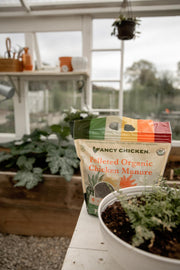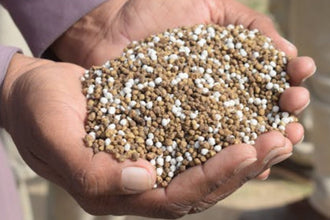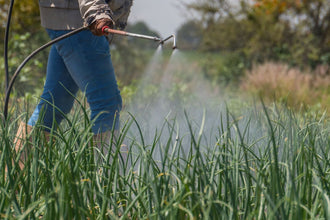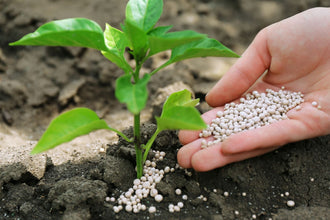
Chicken manure beats cow manure hands down when you look at the actual numbers. Most gardeners grab whatever manure they can find at the garden center, but the difference between these two is huge. You're looking at way more nutrients in chicken manure than you'll ever get from cow manure.
Here's what really matters: fresh chicken manure has about 3-4% nitrogen while cow manure barely hits 1%. That's not even close. The phosphorus and potassium numbers are just as shocking. Once you see how chicken manure stacks up against cow manure, you'll understand why smart gardeners make the switch.
How Chicken Manure Gets Its Power
Chickens process food completely different than cows do. Their digestive system is short and fast, so nutrients don't get broken down as much. Most of the good stuff stays right there in the waste where your plants can use it.
Cows have four stomachs that work overtime breaking everything down. By the time food becomes manure, a lot of the nutrients are already gone. The fermentation process that happens in cow stomachs actually destroys many of the nutrients that plants need most.
Think about what these animals eat too. Chickens get concentrated feed packed with protein. Cows mostly eat grass and hay. The better the diet going in, the better the fertilizer coming out. Chicken manure wins this round easily.
The biology makes sense when you really think about it. Chickens are built for efficiency. They eat concentrated food and produce concentrated waste. Cows are built to digest tough plant material, which means their manure is diluted by the time it's ready to use.
The Real Numbers Behind Chicken Manure vs Cow Manure
You need to see these numbers to believe how big the difference really is between chicken manure and cow manure.
Fresh Chicken Manure:
-
Nitrogen: 3.0-4.0%
-
Phosphorus: 2.0-3.0%
-
Potassium: 1.5-2.5%
Fresh Cow Manure:
-
Nitrogen: 0.5-1.0%
-
Phosphorus: 0.2-0.5%
-
Potassium: 0.5-1.0%
Chicken manure gives you three to four times more nitrogen than cow manure. The phosphorus difference is even crazier - we're talking about six times more in some cases. Even potassium, where the gap is smallest, chicken manure still doubles what you get from cow manure.
Composted versions follow the same pattern. Sure, the overall numbers drop a bit during composting, but chicken manure still crushes cow manure in every category. There's really no contest here.
Why Your Garden Responds Faster to Chicken Manure
Plants love chicken manure because they can actually use all those nutrients right away. You'll see greener leaves within a couple weeks of putting it down. The high phosphorus helps roots grow stronger and flowers bloom better. The potassium keeps plants healthy and helps them fight off diseases.
Cow manure takes forever to show results because there just isn't much there to work with. Some people like the slow release, but most gardeners want to see their plants respond quickly. Chicken manure gives you both fast results and long-term soil improvement.
The microbes in your soil go crazy for chicken manure too. All that organic matter feeds the beneficial bacteria and fungi that make soil healthy. More microbes means better nutrient cycling and soil structure. Cow manure can't compete with this level of biological activity.
Your plants will tell you the difference. Vegetables grow bigger and produce more fruit. Flowers bloom longer and brighter. Grass gets thicker and greener. These aren't small differences - they're the kind of changes that make your neighbors ask what you're doing different.
How Much Less Chicken Manure You Actually Need
Here's something most people don't realize about chicken manure vs cow manure - you need way less chicken manure to get the same results. A 2-3 inch layer of composted chicken manure does what 4-6 inches of cow manure does.
This means less hauling, less spreading, and less storage space needed. Your back will thank you, and your wallet will too. When you calculate cost per nutrient instead of cost per bag, chicken manure wins every time.
Fresh chicken manure is pretty strong stuff though. You can't just dump it straight on plants like you might with cow manure. It needs to be composted or aged for a few months first. That high nitrogen content will burn your plants if you're not careful.
The efficiency really adds up over time. Less material to buy, less work to spread it, and better results in your garden. Chicken manure makes gardening easier while giving you better plants.
pH Levels and Extra Minerals in Chicken Manure
Most plants love the pH that comes with chicken manure. It usually sits right around 6.5 to 7.5 after composting, which is perfect for vegetables and flowers. Cow manure tends to be more alkaline, and that can cause problems for plants that like acidic soil.
Chicken manure brings more minerals to the party too. You get extra calcium for strong cell walls, magnesium for green leaves, and sulfur for protein building. These aren't in the NPK numbers, but plants need them just as much.
The trace elements are where chicken manure really shines compared to cow manure. Zinc, copper, and manganese show up in much higher amounts. These micronutrients might be needed in small doses, but they're often missing from garden soil. Chicken manure fills in these gaps naturally.
Most gardeners don't think about secondary nutrients and trace elements, but they're what separate good gardens from great ones. Chicken manure delivers a complete package instead of just the basic NPK that everyone talks about.
Building Better Soil Long-Term with Chicken Manure
Regular applications of chicken manure create soil that gets better every year. The high organic matter content builds up faster than cow manure because there's just more good stuff in each application. Better organic matter means soil that holds water when plants need it and drains well when they don't.
Soil structure improves dramatically with chicken manure. The organic compounds help create stable clumps of soil that don't compact easily. Roots can penetrate deeper and spread wider. Water and air move through the soil better.
The carbon in chicken manure feeds soil microbes that do most of the heavy lifting in healthy soil. These tiny workers break down organic matter, release nutrients, and create the biological activity that plants depend on. Cow manure just doesn't have enough carbon to support the same level of microbial activity.
Think of chicken manure as an investment in your soil's future. Each application makes the next season better. After a few years of using chicken manure instead of cow manure, you'll have soil that other gardeners envy.
Chicken Manure Costs Less Per Nutrient
The sticker price might fool you, but chicken manure almost always costs less per unit of actual nutrition. You might pay more per bag compared to cow manure, but you're getting way more bang for your buck in terms of what plants can actually use.
Transportation costs work in your favor too. Hauling smaller amounts of chicken manure instead of massive piles of cow manure saves gas and time. If you're buying by the truckload, chicken manure makes even more sense.
Storage is easier with chicken manure because you need less space for the same nutritional punch. This matters a lot if you're working with a small yard or limited storage options.
The fast results from chicken manure can cut your fertilizer budget throughout the season. Instead of multiple applications of weaker cow manure, one good dose of chicken manure often carries plants through the entire growing period.
Smart Ways to Use Chicken Manure
Composting chicken manure before you use it is the safest bet for most situations. Fresh chicken manure is so concentrated it can actually hurt plants instead of helping them. Proper composting tames that power while keeping most of the nutritional benefits.
Timing matters more with chicken manure than cow manure. Spring applications give nutrients time to settle into the soil before planting. Fall applications let everything break down slowly over winter, so it's ready when spring arrives.
Watch your watering when you use chicken manure. Those concentrated nutrients can wash away with too much water or heavy rain. Pay attention to moisture levels and adjust your sprinklers accordingly.
Start with smaller amounts if you're switching from cow manure to chicken manure. The difference in potency catches some gardeners off guard. Better to use less and add more later than to overdo it and stress your plants.
Fancy Chicken Organic Pelletized Chicken Manure Takes It Further
Fancy Chicken has solved the biggest problem with traditional chicken manure - the mess and smell. Their organic pelletized chicken manure gives you all the nutritional benefits we've talked about in a clean, easy-to-use form.
You get the same 4-2.5-2 NPK ratio that makes chicken manure superior to cow manure, but without the hassle of composting or dealing with fresh waste.
The pelletized format means consistent nutrient distribution every time. No hot spots that might burn your plants. No clumping that leaves some areas overfed while others get nothing. Fancy Chicken's pellets break down gradually, releasing nutrients at the perfect pace for plant uptake.
Why Pelletized Beats Fresh or Composted
Fresh chicken manure requires months of composting before it's safe to use. Composted chicken manure can be inconsistent depending on how it was processed. Fancy Chicken eliminates these problems with their controlled pelletizing process:
-
Pathogen-free guarantee - Heat treatment during pelletizing kills harmful bacteria
-
Consistent nutrient levels - Every pellet contains the same balanced nutrition
-
Extended shelf life - Pellets stay fresh for years when stored properly
-
Easy application - Spreads evenly by hand or with standard fertilizer equipment
-
No odor issues - Pleasant, earthy smell instead of barnyard stench
The pelletizing process also concentrates the nutrients even further. You're getting premium chicken manure in its most potent, user-friendly form.
Application Rates That Make Sense
Fancy Chicken's pelletized formula makes measuring simple. For established gardens, use 2-3 pounds per 100 square feet. New plantings need just 1-2 pounds per 100 square feet. Compare that to the wheelbarrows full of cow manure you'd need for the same results.
The slow-release nature means you can apply Fancy Chicken pellets and forget about them for 4-6 weeks. The nutrients keep feeding your plants while improving soil structure and microbial activity. One application often carries vegetables through their entire growing season.
Storage and Handling Advantages
Bagged pellets store anywhere dry without attracting flies or creating smell problems. Stack them in your garage, shed, or basement without worry. Try doing that with fresh cow manure and see how long your family puts up with it.
The pellets won't compact or turn into mush like traditional manures. They stay workable in all weather conditions. Rain or shine, you can apply Fancy Chicken pellets without creating a muddy mess in your garden.
Working with pellets is cleaner too. No special gloves needed. No washing down after every application. You can fertilize your flower beds in your good clothes if you want to.
Your Garden Deserves the Best Nutrition Available
The science is clear - chicken manure delivers superior nutrition compared to cow manure in every measurable way. Fancy Chicken takes that natural advantage and makes it practical for modern gardeners.
Stop settling for weak cow manure that barely moves the needle on plant growth. Your vegetables, flowers, and lawn deserve the concentrated nutrition that only premium chicken manure can provide. Make the switch to Fancy Chicken's pelletized organic fertilizer and see what your garden can really do when it gets the nutrition it's been missing.
Environmental Impact of Chicken Manure vs Cow Manure
Chicken manure wins the efficiency game from an environmental standpoint too. You transport less material and apply less volume to get better results. That means less fuel burned and fewer trips to the garden center.
The concentrated nature of chicken manure does create some runoff concerns near streams or ponds. The nutrients dissolve faster than cow manure, so timing and placement become more important. Proper composting and careful application solve most of these issues.
Local availability usually trumps everything else for environmental impact. Whatever manure you can get close to home is probably the greenest choice. But if you have options, chicken manure's superior efficiency often justifies traveling a bit further to get it.
The bottom line is simple: chicken manure delivers more nutrition per pound than cow manure in every category that matters. Higher nitrogen, phosphorus, and potassium levels mean better results with less material. Your plants get better nutrition, your soil improves faster, and you save money in the long run. Chicken manure vs cow manure isn't even close when you look at the real numbers.








